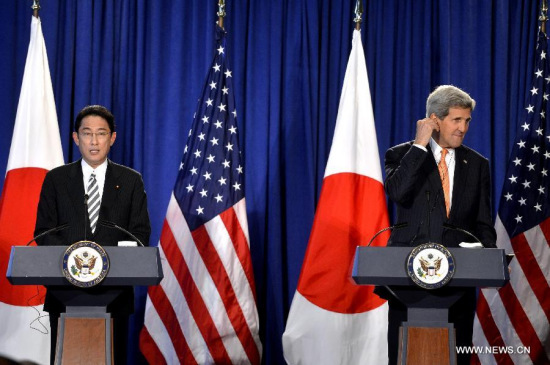
U.S. Secretary of State John Kerry (R) and Japanese Foreign Minister Fumio Kishida attend a press conference in New York, the United States, on April 27, 2015. U.S. and Japan announced on Monday new guidelines for bilateral defense cooperation, allowing Japan's self defense forces to take on more ambitious global role that the Shinzo Abe administration has been seeking. (Xinhua/Wang Lei)
U.S. and Japan on Monday announced new guidelines for bilateral defense cooperation, allowing Japan's self defense forces to take on more ambitious global role that the Shinzo Abe administration has been seeking.
Under the new guidelines, revised for the first time since 1997, Japan will have the rights to exercise collective self-defense, therefore being able to defend other countries that may come under attack, said the U.S. Defense Department in a news release. It also allows for increased regional and global cooperation in the U. S.-Japanese alliance.
A joint statement of the New Guidelines for U.S.-Japan Defense Cooperation was released after the U.S. and Japanese foreign and defense ministers met in New York City Monday morning.
"U.S. welcomes and supports the ongoing efforts to develop the legislation, which is to reflect Japan's policy of 'Proactive Contributions to Peace' and its July 2014 cabinet decision," the statement said.
The Abe administration, through reinterpreting the constitution in July last year, gave green light to the Self-Defense Forces ( SDF) to exercise the collective defense, which allows for Japan's involvement in the defense of its allies. Previously, Japan's war- renouncing constitution allows the SDF to use force only if Japan itself was directly threatened. The move evoked harsh criticism both from home and abroad.
Fang Yan, a Chinese political commentator in New York, told Xinhua that the new defense guidelines will allow Japan to expand its military force and to get involved in global issues.
"It not only aims to contain the influence of China but also seek to defend hegemony of U.S.-Japanese alliance in East Asia," he said. "It will also help U.S. in its military existence across the world."
Lichuang Zhu, bureau chief of Asia-American Times in New York, said that this year marks the 70th anniversary of the victory of the anti-Japanese War, but the United States forgets the pains that Japanese military had inflicted on America, and forgets that so many American servicemen were abused and ten of millions of Asian civilians were killed.
"It's a pity that America forgets the history and is only seeking the current interests by supporting Japan to reinterpret the constitution," he told Xinhua.
The new guidelines said that U.S. 2015 National Security Strategy articulates that as the United States is actively implementing its rebalance to the Asia-Pacific region, it is central for the U.S. to be committed to the defense of Japan.
The changes would allow greater cooperation in enhancing Ballistic Missile Defense capacities, enhanced collaboration on space security, and continued progress in cooperation on cyberspace issues, said the guidelines.
The revisions to the guidelines came on the second day of Japanese Prime Minister Abe's week-long visit to the United States, during which Abe is expected to meet U.S. President Barack Obama, and deliver a speech at the joint session of the U.S. Congress.
The prime minister's trip to the United States comes amid growing demand for him to apologize for Japan's past war crimes.
On Monday, dozens of protesters shouted "Abe must apologize!" as Abe delivered a speech at the Harvard University.
In a recent editorial, the New York Times also advised that Japan cannot "credibly fill that broader role" of a 21st-century leader, as envisioned by Abe, "if it seeks to repudiate criticism of its past."
The newspaper also linked the success of Abe's visit partly to his efforts to "confront Japan's wartime history, including its decision to wage war, its brutal occupation of China and Korea, its atrocities and its enslavement of thousands of women forced to work as sex slaves or comfort women in wartime brothels."
















































